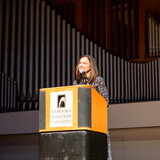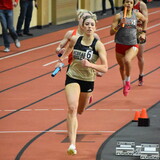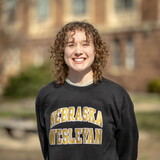Two Nebraska Wesleyan University students have returned from Washington, D.C., where they were among an estimated 250,000 mildly politically frustrated activists.
Seniors Brad Gilligan and Shana Perry attended the “Rally to Restore Sanity and/or Fear” hosted October 30 by Comedy Central funnymen Jon Stewart and Stephen Colbert.
“I think the biggest thing people got out of it was that there are thousands of other people who think the way they do,” Perry said.
The rally was held at the National Mall and was geared toward unsatisfied voters yearning to bring moderation and civility back to the national political discourse. The event drew nearly 200,000 more participants than organizers had anticipated.
But Gilligan and Perry were more than just participants. Last month Gilligan brainstormed research ideas with communication professor Patty Hawk.
“Wouldn’t it be fun to research this rally?” Gilligan asked Hawk.
With Hawk’s enthusiastic approval and funding from the Student Affairs Senate and the student newspaper, Gilligan asked fellow communication studies student Perry to join him in the research. Together they would explore American literary critic Kenneth Burke’s theory on “comedy vs. tragedy frames.” According to Burke’s theory, comedy allows for a new form of understanding that is otherwise not possible through traditional or tragic modes of criticism.
Gilligan and Perry headed to Washington, D.C., to see if Comedy Central’s rally supported this theory, which they learned about in their communication classes.
The seniors stood shoulder to shoulder with rally participants until they found a condiment table to stand on during the event. They were luckier than thousands of other rally participants with the opportunity to actually see the rally stage.
“It was mostly entertaining,” Perry said. “Jon Stewart closed with a serious message but otherwise the rally seemed more like a party.”
Once the rally concluded, Gilligan and Perry interviewed participants, asking them their reason for attending, the effect the rally will have on their future political involvement, and whether or not they were influenced by the rally.
Gilligan said they were surprised to learn that those interviewed admitted the rally did not politically influence them.
“But I think the rally restored a little hope for people,” Perry added. “And everyone we talked to was planning to vote.”
And in that way, the rally was a success.
“It was very much a party atmosphere but it was also a way to remind Washington that we’re here and we vote,” said Perry.
Gilligan and Perry will now transcribe their interviews, watch their recording of the rally, write their paper and eventually present their research.
In addition to it being a unique academic opportunity, Gilligan and Perry said their project is giving them a first look at the kind of research they will conduct in graduate school. Both plan to study communication.
“I’ve been to other rallies before and this was nothing like the others,” Gilligan said. “People were very friendly and happy. It was a great experience.”














